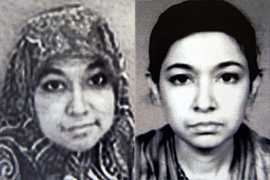US verdict sparks Pakistan protests
Thousands rally against conviction of scientist Aafia Siddiqui for attempted murder.

Siddiqui, who was arrested in 2008, was accused of grabbing a US serviceman’s rifle and opening fire on her American interrogators, who returned fire.
While none of the US agents or personnel were injured, Siddiqui was shot in the incident.
Siddiqui’s relatives condemned the verdict, with Fauzia Siddiqui, her sister, saying the verdict had “rejuvenated” the family.
| In video | |||||
|
“And we’re proud to be related to her,” she said, speaking from the Pakistani city of Karachi.
“America’s justice system, the establishment, the war on terror, the fraud of the war on terror, all of those things have shown their own ugly faces.”
The AFP news agency quoted Ismat Siddiqui, Aafia’s mother, who lives in Karachi, as saying the family had been braced for the verdict but would continue to work for her release.
“I did not expect anything better from an American court. We were ready for the shock and will continue our struggle to get her released,” she was quoted as saying.
Government ‘dismayed’
Pakistan’s government has expressed “dismay” over the verdict, vowing to consult her family and lawyers on how to get Siddiqui released.
Abdul Basit, a foreign ministry spokesman, said the government would do its best to secure her release.
 |
| Siddiqui was missing for five years prior to her arrest in Afghanistan [EPA] |
“The ultimate objective is to get her back to Pakistan and we would do everything possible and we’ll apply all possible tools in this regard,” he said.
Kamal Hyder, Al Jazeera’s correspondent in Islamabad, the Pakistani capital, said that as far as public opinion is concerned, the verdict is definitely not in favour of the Americans.
“There is also disappointment with the [Pakistani] government for failing to find a diplomatic way out and getting Aafia Siddiqui back home, because they feel she was innocent.”
Before her arrest, Siddiqui had been missing for five years, during which time her family alleges she was held at the US military’s Bagram airbase in Afghanistan.
Both the US and the Pakistani authorities deny that Siddiqui was in custody before her arrest in 2008 in the town of Ghazni.
Hyder said: “Many hundreds of people have disappeared from Pakistan – they’re still not accounted for – and now that Dr Aafia’s case has come up, that’s likely to be a rallying point for the anti-American sentiment.”
Trial ‘flawed’
Cageprisoners, a UK-based rights group, rejected the verdict, citing the fact that evidence about Siddiqui’s whereabouts prior to her arrest had been disallowed from the trial.
“The case of Aafia Siddiqui carries great significance in terms of the ability of the Obama administration to administer justice,” Asim Qureshi, a spokesman for the group, said, referring to the administration of Barack Obama, the US president.
“Already we have seen a blanket refusal to look at the facts of her detention prior to 2008, this verdict will only confirm what many already believe, that it is impossible for Muslim terrorism suspects to receive a fair trial in the US.”
At the time of her arrest Siddiqui was allegedly carrying containers of chemicals and notes referring to mass-casualty attacks and New York landmarks.
But she was not charged in connection with those materials and the charges she was convicted of made no mention of terrorism.
During the trial, Linda Moreno, Siddiqui’s defence lawyer, argued that there was no evidence the rifle Siddiqui was accused of taking had ever been fired, since no bullets, shell casings or bullet debris were recovered and no bullet holes detected.
Moreno also said the testimony of the government’s six eyewitnesses contradicted one another.
Siddiqui faces up to life in prison when she is sentenced on May 6.
Her lawyers have said they intend to appeal the verdict.
